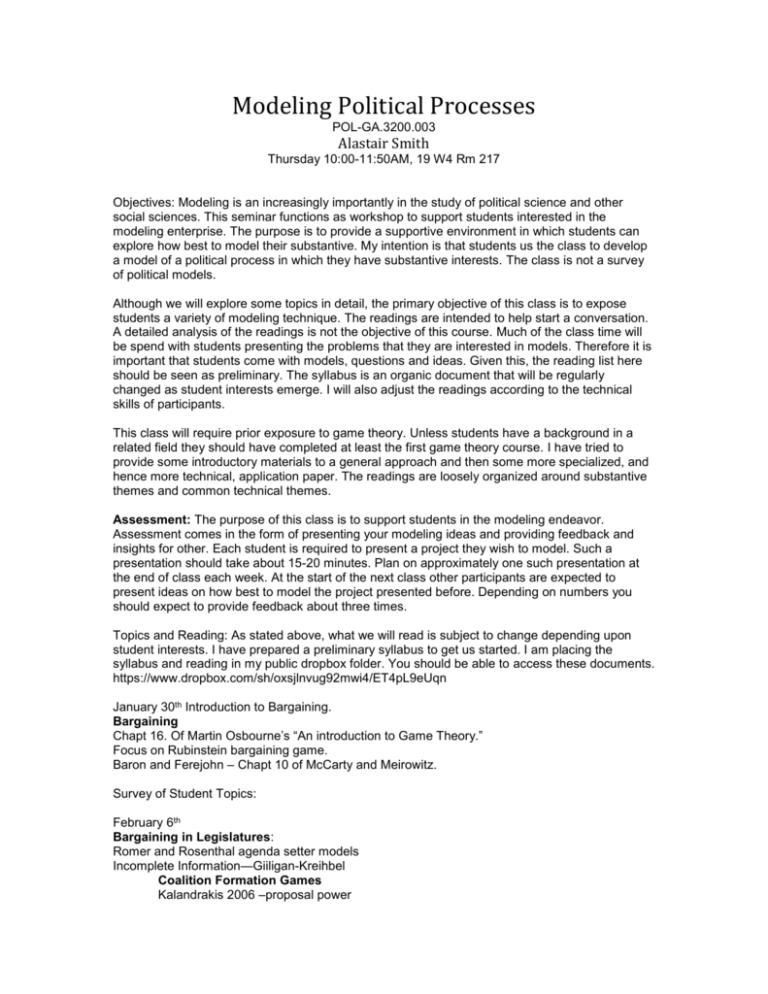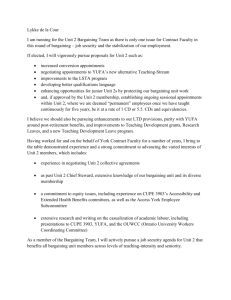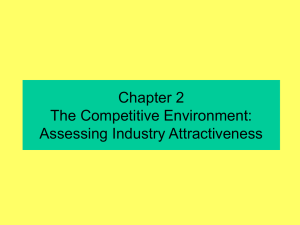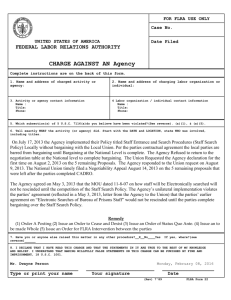Modeling Political Processes (Lab)
advertisement

Modeling Political Processes POL-GA.3200.003 Alastair Smith Thursday 10:00-11:50AM, 19 W4 Rm 217 Objectives: Modeling is an increasingly importantly in the study of political science and other social sciences. This seminar functions as workshop to support students interested in the modeling enterprise. The purpose is to provide a supportive environment in which students can explore how best to model their substantive. My intention is that students us the class to develop a model of a political process in which they have substantive interests. The class is not a survey of political models. Although we will explore some topics in detail, the primary objective of this class is to expose students a variety of modeling technique. The readings are intended to help start a conversation. A detailed analysis of the readings is not the objective of this course. Much of the class time will be spend with students presenting the problems that they are interested in models. Therefore it is important that students come with models, questions and ideas. Given this, the reading list here should be seen as preliminary. The syllabus is an organic document that will be regularly changed as student interests emerge. I will also adjust the readings according to the technical skills of participants. This class will require prior exposure to game theory. Unless students have a background in a related field they should have completed at least the first game theory course. I have tried to provide some introductory materials to a general approach and then some more specialized, and hence more technical, application paper. The readings are loosely organized around substantive themes and common technical themes. Assessment: The purpose of this class is to support students in the modeling endeavor. Assessment comes in the form of presenting your modeling ideas and providing feedback and insights for other. Each student is required to present a project they wish to model. Such a presentation should take about 15-20 minutes. Plan on approximately one such presentation at the end of class each week. At the start of the next class other participants are expected to present ideas on how best to model the project presented before. Depending on numbers you should expect to provide feedback about three times. Topics and Reading: As stated above, what we will read is subject to change depending upon student interests. I have prepared a preliminary syllabus to get us started. I am placing the syllabus and reading in my public dropbox folder. You should be able to access these documents. https://www.dropbox.com/sh/oxsjlnvug92mwi4/ET4pL9eUqn January 30th Introduction to Bargaining. Bargaining Chapt 16. Of Martin Osbourne’s “An introduction to Game Theory.” Focus on Rubinstein bargaining game. Baron and Ferejohn – Chapt 10 of McCarty and Meirowitz. Survey of Student Topics: February 6th Bargaining in Legislatures: Romer and Rosenthal agenda setter models Incomplete Information—Giiligan-Kreihbel Coalition Formation Games Kalandrakis 2006 –proposal power Morelli 1999 -- Demand Competition and Policy Compromise in Legislative Bargaining McCarty and Mierowitz 2007- p.197-203 (Austen-Smith &Banks) Royce and Cox 2007 –Gamson’s Law February 13th Alliances Deterrence and Alliance Formation Smith 1995; Morrow 1994; Fearon 1995 Tying hands vs sunk cost. Student Paper: Sukwon Lee “policy concessions and regime type in alliance” February 20th No Class February 27th Infinitely Repeated Games (and Leaders Matter) Classic Grim Trigger in PD and Folk Theorems: McCarty and Meirowitz 2004 ch9 p.251-274. Osborne p. 426-450. Notes from Levin McGillivray and Smith LSGT Milgrom, North and Weingast 1990. Law Merchant Morrow coordination/cooperation Fearon – credible commitment to cooperate vs. negotiating an agreement March 6th Global Games: Ethan Bueno de Mesquita. 2010. "Regime Change and Revolutionary Entrepreneurs." American Political Science Review 104(3):446-466. Scott Tyson presentation on global games with multiple groups March 13th Regime Change I: Svolik (Carlo), Bois and Svolik (Emine), Ghandi and Przeworski (Alastair) –Rodolpho to talk about his project March 27th Regime Change II: Acemoglu and Robinson, Theory of Transitions AER (McCarty and Mierowitz 2007 p.193-197) Bdm and Smith 2009; Smith 2008. April 3rd Regime and the Origin of the State: Myerson McGuire and Olson 1996 –roving bandits Egorov and Sonin Fearon: self supporting democracy April 10th Pivotality, Juries and Strategic Voting Condercet Jury Theorems: Osborne p. 301-307. McCarty and Mierowitz 2007 p. 156-161. Myatt: Strategic Voting. Pivotality for rewards. April 17th Spoils, Signaling and Crisis Bargaining Dal Bo and Powell 2009. Banks AJPS Fey and Ramsey 2011 -APS April 24th Bureaucracy May 1st. War of Attrition Osbourne p.77-80; Fundenberg and Tirole 119-126, 216-219. Applications to sanctions: Smith 1995: The success and use of economic sanctions. International Interactions. Application to Audience Costs: Fearon 1994. May 8th Bureaucracy: Stove Piping by Patty and Gailmard Baliga, Sandeep. 1999. Monitoring and Collusion with "Soft" Information. Journal of Law, Economics, & Organization. 15(2): 434-440. Whose Ear to Bend? Information Sources and Venue Choice in Policy-Making, with Fred Boehmke and John Patty, Quarterly Journal of Political Science 2006 Gailmard, Sean, and John W. Patty. 2007. “Slackers and Zealots: Civil Service, Policy Discretion and Bureaucratic Expertise.” American Journal of Political Science 51(4): 873-889. Bargaining and War: Powell 2006; Blainey 1973, Fearon 1995, Smith 1998, Goemans 2000, Wagner 2000, Filson and Werner 2002, Reiter 2003, Slantchev 2003, Powell 2004, Smith and Stam 2004, Walter 2009. Signaling Games: Gilligan and Kreibhel committee models Student Projects OTHER SUGGESTIONS Steve Callender. 2011. "Searching for Good Policies." American Political Science Review 105 (4): 643-662. Brandice Canes-Wrone/Kenneth Shotts. 2007. "When Do Elections Encourage Ideological Rigidity?" American Political Science Review 101 (2): 273-288. Elisabeth Penn. 2008. “Citizenship versus Ethnicity: The Role of Institutions in Shaping Identity Choice." Journal of Politics 70 (4): 1-18. Sylvain Chassang/Gerard Padro i Miquel. 2010. "Conflict and Deterrence under Strategic Risk" Quarterly Journal of Economics 125 (4): 1821-1858. Gerard Padro i Miquel. 2007. "The Control of Politicians in Divided Societies: The Politics of Fear", Review of Economic Studies 74(4): 1259-1274. David Myatt/Torun Dewan. 2007. “Leading the Party: Coordination, Direction, and Communication.” American Political Science Review 101(4) pp. 825-843. William Minozzi. 2011. "A Jamming Theory of Politics." Journal of Politics. 73(2): 301-315. Baliga, Sandeep and Tomas Sjostrom. 2012. "The Strategy of Manipulating Conflict." The American Economic Review 106 (2): 2897-2922. Gerard Padro i Miquel/Pierre Yared. "The Political Economy of Indirect Control". Quarterly Journal of Economics 127(2): 947-1015. Ethan Bueno de Mesquita. 2013. "Rebel Tactics." Journal of Political Economy 121(2):323-357. Ignacio Esponda. 2010. "Behavioral Equilibrium in Economies with Adverse Selection." American Economic Review 98 (4) 1269–1291. Persson, Torsten, Gerard Roland, and Guido Tabellini. 1997. “Separation of Powers and Political Accountability.” Quarterly Journal of Economics 112(4): 1163-1202. Conflict and Information Baliga, Sandeep, David O. Lucca, and Tomas Sj ̈str ̈om. 2011. “Domestic Political Survival and International Conflict: Is Democracy Good for Peace?” Review of Eco- nomic Studies 78: 458-486. Robert Powell,2007. "Allocating Defensive Resources with Private Information about Vulnerability" APSR



![Labor Management Relations [Opens in New Window]](http://s3.studylib.net/store/data/006750373_1-d299a6861c58d67d0e98709a44e4f857-300x300.png)



